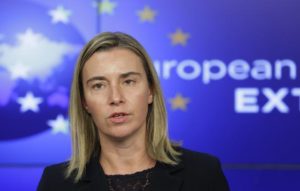

Italian PM Matteo Renzi (AP/Alessandra Tarantino)
Erdogan is unequivocally a despot, but the sultans whose memory he seeks to evoke were more measured than he when it came to managing power.
What deep anger mixed with cunning strategy pervades the furious anathema launched by Turkish President Recip Tayyip Erdogan against the European Union, Federica Mogherini, and Italy. While such behavior is typical of Erdogan, it has now been exacerbated after the thwarted coup and he demonstrates his unrestrained nature while punishing, eliminating and incarcerating his enemies. He is, unequivocally, a despot, but the sultans – whose memory Erdogan seeks to evoke – were more measured than he when it came to managing power. Italian Prime Minister Matteo Renzi has done well to rebuff Erdogan’s comments about his son under investigation for money laundering in Bologna. Erdogan wants to cancel the accusation just screaming at Italy: he presumes that having good relations with a country means being able to rob it, to accuse it of treason and then get it to fold through intimidation and threats.
In an interview with Italian TV, Erdogan called on Italian judges to focus instead on the mafia: but the mafia has nothing to do with the issue and it’s here simply a vulgar anti-Italian innuendo. The threat to Italy is here a breakout with Turkey that could lead to an invasion of refugees. His aggressiveness does not imply only a diplomatic problem, but a historic and fatal crisis connected to the Mediterranean disaster. Is Erdogan simply angry? He’s not only prey to his difficult temper: in his attack on the EU one clearly sees the cynic calculation coming after his historical disappointments.


EU Foreign Policy Chief Federica Mogherini (BETA/AP/File)
With the pact with Europe on March 18, with which in exchange for substantial Turkish support in addressing the migration crisis, Turkey was promised the lifting of visa requirements for its 75 million citizens, 3 billion Euros, and the reopening of talks about its entrance into the EU. This is all at risk now. Erdogan has scared and shocked everyone with his bloody post-coup reaction. The promised reintroduction of the death penalty (actually already practiced!), the 15,000 arrested, the 70,000 suspended from work, the hundreds of schools closed, the 130 newspapers silenced… Erdogan attacks, threats blackmails in order to get what he wants no matter what. In terms of money, very little has arrived into Turkish pockets, and Europe ponders a plan B with Greece and its islands.
Turkey’s disappointments have been fermenting by now for some years: from the resounding success during the period of the Arab Spring in which the whole world sung the praises of the moderate Muslim country, which was a friend of the Americans and seemed almost European, Turkey is now a different State. It became a country ruthlessly attacked by terrorism, a passage to Iraq and Syria for freedom fighters. Its foreign policy has completely failed, and has returned on a collision course with its traditional enemy, Russia. Moreover, the alliance with Syria has been reversed completely, the relationship with the US has crumbled, its membership to NATO loses every day any meaning.
Erdogan is more and more just a world leader of the Muslim Brotherhood, Hamas’s brother and Qatar’s close friend. Moreover, the attack now in Libya punishes its protégé, the Tripoli government, favoring that of Tobruk. And most of all the worst blow, the attempted coup d’état. Furthermore, Germany didn’t even allow Erdogan to address his supporters by video at a rally of 30 thousand people who showed up on his behalf in Cologne this past weekend.
People wave Turkish flags as they gather in Taksim Square in Istanbul, protesting against the attempted coup, Wednesday, July 20, 2016. (AP/Hussein Malla)
Erdogan exploded and threatened Italy and Europe at gunpoint: Either you do as I want, or I will punish you with a flood of refugees. This is the message to the world. What a damned nuisance this Europe, and yet it was on the right track.
In June, when Mogherini summoned Ambassador Hansjörg Haber, who had dared to say that Erdogan used “too broad a definition of terrorism” in order to carry out his purges, she seemed to have understood the message. But afterword, somebody dared protesting his measures, accusing his son of corruption… What’s going on over here? Sometimes even sultans exaggerate, and perhaps by now Europe understands it has more to lose than to gain from this pre-Ataturk Turkish leader.
By: Fiamma Nirenstein
(Translated from Italian by Amy K. Rosenthal)
The author is a prominent Italian-Israeli journalist, author and politician.

